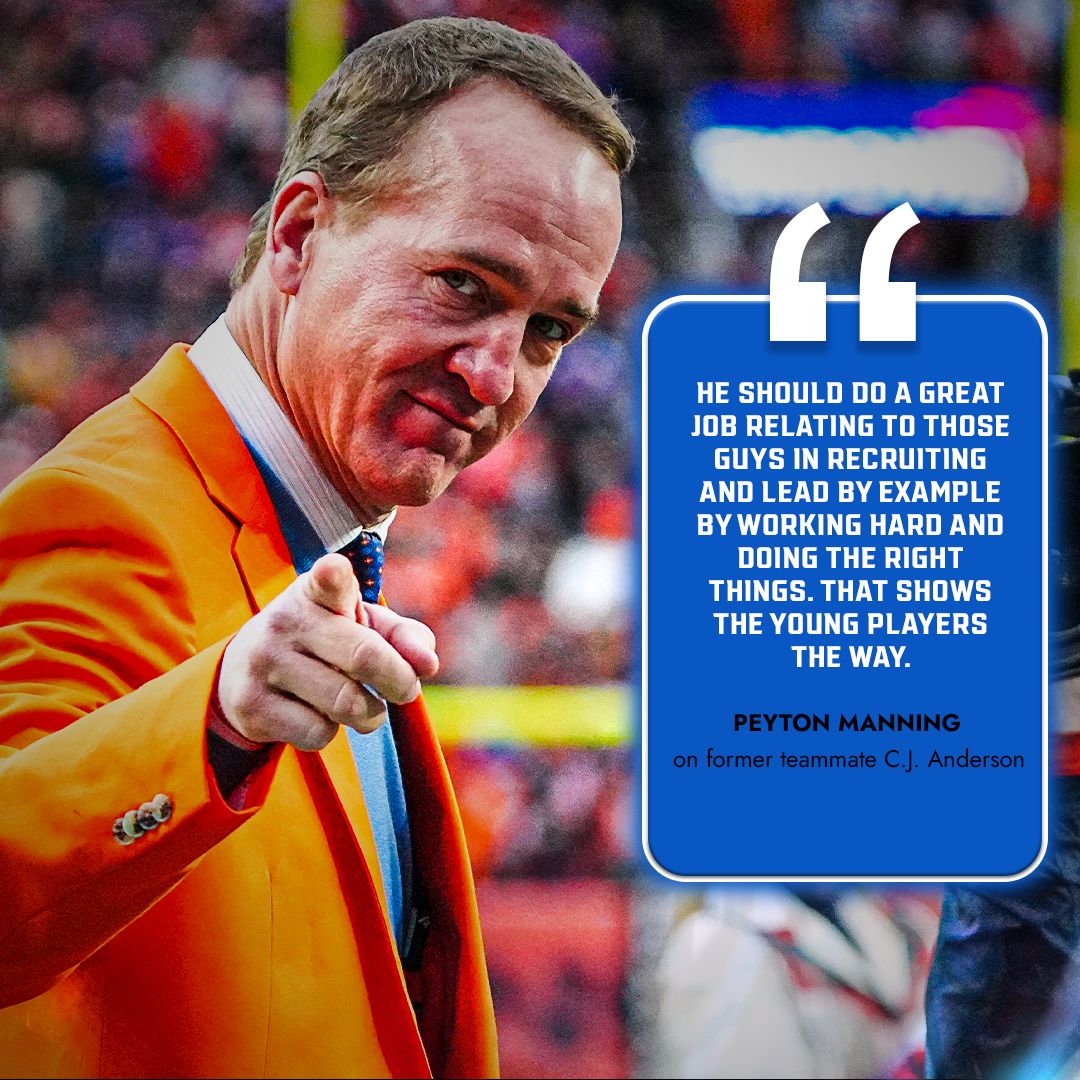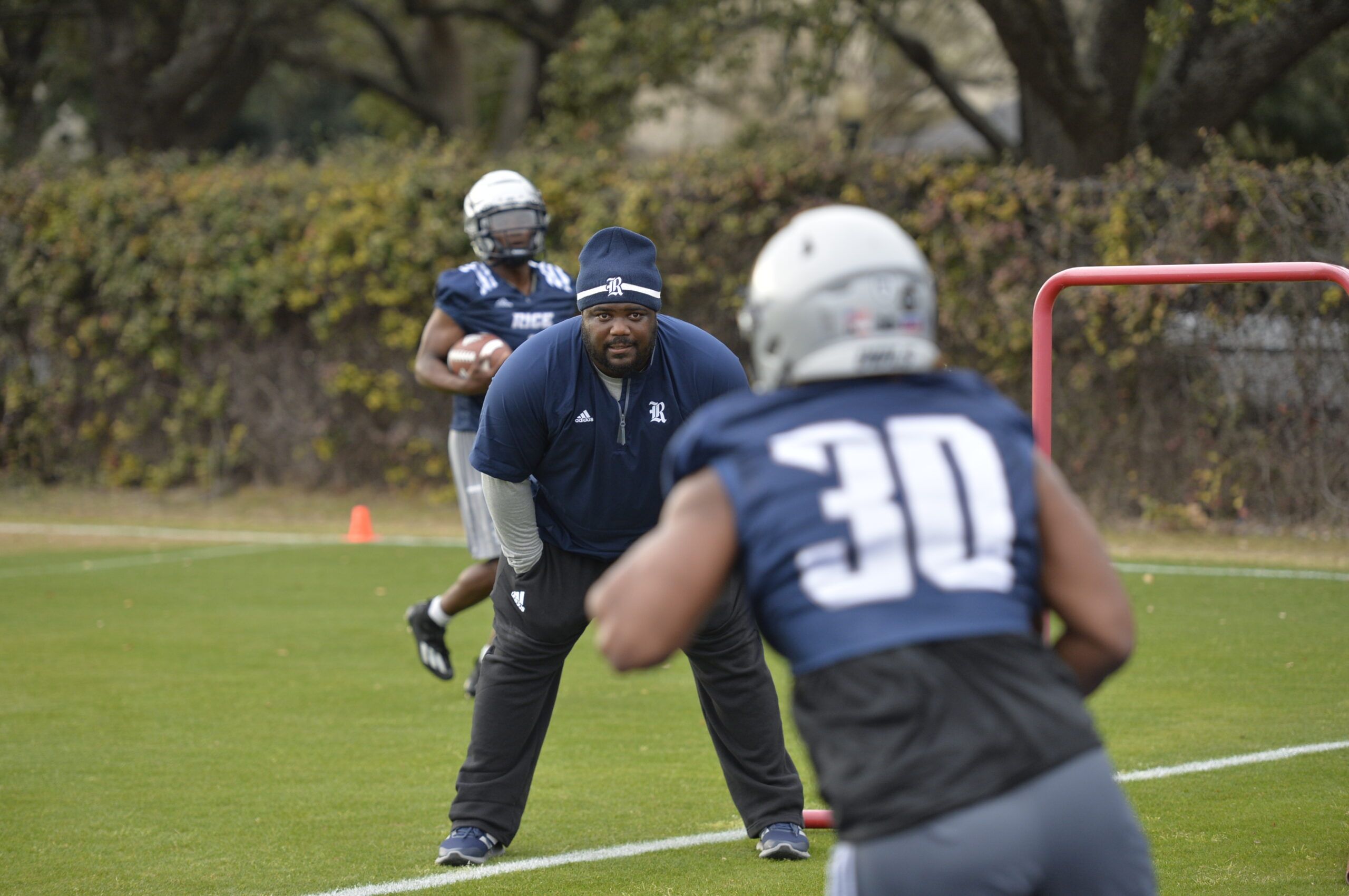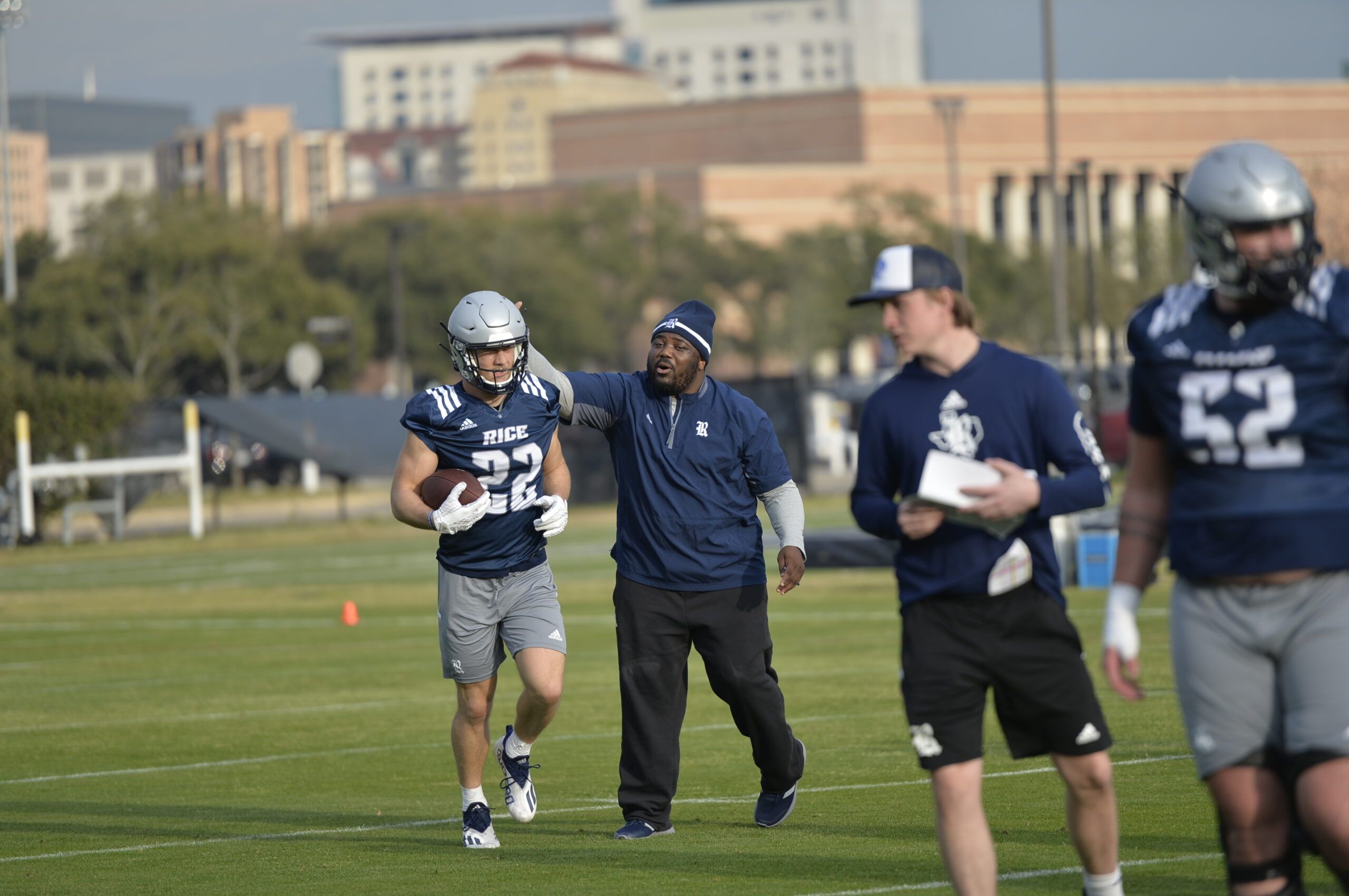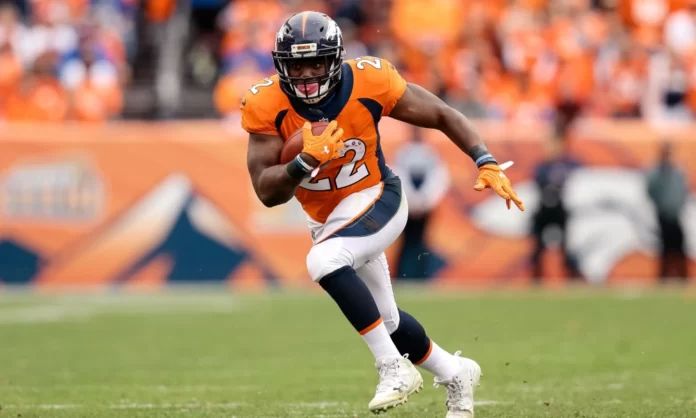HOUSTON — Inside a darkened film room at the Denver Broncos’ training facility, blitzing linebackers flashed across the screen as Peyton Manning studied defensive tendencies. Their rapid approach to the line of scrimmage declared a problem to solve and a collaboration to follow.
Always sweating the details, the ultra-demanding future Hall of Fame quarterback was joined at dawn by another student of the game: undrafted rookie running back C.J. Anderson.
Former NFL running back C.J. Anderson hired as Rice RBs coach
In Manning, Anderson found a kindred spirit. Both were eager to learn more about every nuance of football and develop a way to gain a competitive edge.
It was moments like those with Manning, one of the greatest quarterbacks in the history of the game, and a vast inventory of knowledge gained during a seven-year NFL career before retiring at age 29 that prompted Anderson to launch a coaching career.

The former Pro Bowl running back is the new running backs coach at Rice University.
“C.J. was very inquisitive,” Manning said in a telephone interview. “He always asked questions and wrote things down in a notebook. To me, those are good signs of being a studious player. And a lot of those qualities translate into being a good coach. I think C.J. will do a great job. He was always a smart player. He should do a great job relating to those guys in recruiting and lead by example by working hard and doing the right things. That shows the young players the way.
“As a player, C.J. was strong, tough, durable, and dependable. He was going to protect the ball and get those positive yards by always going downhill. He caught the ball well out of the backfield. He knew who to block. He understood his pass protections. We used to meet in the mornings, and we would go over all of the protections. He took pride in the craft of playing running back, which can really help all of his players develop and learn.”
The lessons imparted by Manning nine years ago, and the philosophies Anderson gleaned from Gary Kubiak and Adam Gase with the Broncos and, later, from Sean McVay with the Los Angeles Rams, resonate strongly with him in his current job.
Anderson’s transition to coaching
After his playing career, Anderson spent a season as a volunteer assistant at Cal, his alma mater. Then, he took over as the head coach at Monte Vista High School in Danville, Calif., going 7-3 in his lone season there. Now, Anderson is digging into everything that goes with being a college football coach after Rice head coach Mike Bloomgren hired him this spring.
Recruiting. Running drills. Installing plays. Meetings. Constantly talking with his players about football and life.
“It all started early in my career when I was in Denver, playing with a guy like Peyton and knowing that audibles can be called at any time, you had to be a master of the playbook,” Anderson said in between meetings at the Rice football training facility.
“Me and Peyton would meet a lot in the mornings and talk about the things that go with the game of football. When I moved over to play for the Rams, it was all about grabbing that playbook and dissecting it. I think that’s when I became a better football player. That was defining.
“I saw what coach Kubiak liked to call, what coach McVay or Adam Gase liked to call. What was Peyton feeling that day? That helped me to anticipate a lot and that was a huge help. It gave me a leg up. Nothing really changes too much as a college coach. The game is the same. Obviously, you’ve got to teach and I’m having a lot of fun teaching kids and trying to grow and pass on the knowledge that’s been passed on to me. Loving the game is always where it starts. It’s about having passion for football.”
Rice University @RiceFootball running backs coach C.J. Anderson @cjandersonb22 is applying what he learned in the NFL with @Broncos Peyton Manning, Gary Kubiak and with @RamsNFL Sean McVay as a coach with big goals for the future @PFN365 #CollegeFootball pic.twitter.com/nxeAF5hOyI
— Aaron Wilson (@AaronWilson_NFL) June 2, 2022
Former NFL head coach Gary Kubiak’s rave reviews
When Anderson retired in 2019 after playing in three Super Bowls and winning one (Super Bowl 50), it wasn’t long before he got involved in coaching. After playing for the Broncos, Panthers, Raiders, Rams, and Lions, the Vallejo, Calif., native knew exactly what he wanted to do.
It didn’t surprise Kubiak, a retired former Super Bowl-winning coach and quarterback, to see how Anderson has embraced the coaching profession and recognize his potential for a leadership role in the future through his ability to communicate.
“When a player gets out of football, the first thing they’ve got do is find their way and determine what’s next for them in life,” Kubiak said. “You could tell C.J. had a big heart and wanted to work with kids. He got into coaching for the right reasons because he wants to teach. He goes back to Cal and then to a high school and then, all of a sudden, he moves his family down to Houston and pops up at Rice. I think he’s going to be very successful. He’s a very bright young man. He has a gift. He loves to talk. He never met a stranger. He’s in the business for the right reasons. I wouldn’t be surprised to see him move up the ladder fast.
“When I coached him in Denver, I teased him and would say, ‘C.J., you’ve got to shut up.’ He loves to talk. He’s a very bright, engaging person. He’s got a great family. One of the main reasons he was so successful when he played was how bright he was. That made him a better player.I was talking to a couple of people over at Rice involved in the football program and I told them, ‘He’s going to be such a great asset for you guys and will be tremendous recruiting kids.’ Nothing would surprise me to see how far C.J. will go as a coach. He has tremendous potential.”
Successful playing career
Named to one Pro Bowl in 2014 after rushing for 849 yards, Anderson scored the Broncos’ only offensive touchdown and had 100 all-purpose yards in a 24-10 Super Bowl win over the Panthers in 2015.
Cut by three teams in 2018, including the Broncos, Panthers, and Raiders, Anderson stepped in as a key late-season replacement for an injured Todd Gurley with the Rams.
Five days after being called off the couch, Anderson rushed for 167 yards and a touchdown in a win over the Arizona Cardinals. He rushed for 132 yards and a touchdown one week later in a win over the San Francisco 49ers, gaining 299 yards and two touchdowns in two regular-season games. Then, Anderson rushed for 123 yards in a Divisional Round win over the Dallas Cowboys to help Los Angeles reach the Super Bowl.
Anderson played in three Super Bowls, retiring with 3,497 career rushing yards and 22 touchdown runs. He was known for his hard-nosed running style and ability to read holes and find daylight.
“I played with some great players,” Anderson said, who referenced Manning, Champ Bailey, Von Miller, DeMarcus Ware, Aqib Talib, Aaron Donald, and several others. “A lot of these players were at the top of their position at one point. I took a lot of that craft with me. With my own knowledge, that’s all helped me with coaching. I teach my guys by implementing game-like situations. Whenever I’m watching film with them, I can bring them back to what drill we did to help them make the right cut and make the right read.
“I was in some big-time systems. From Kub, I learned a lot about the quarterback position and how he teaches it. Coach Kub, along with Peyton, gave me a leg up about the quarterback position. I think McVay was innovative by taking a West Coast system from Mike Shanahan and Kyle Shanahan and figuring out how to get your best players the ball and how to give the defense some problems. Whenever my time comes to be a play-caller or a head coach, it’s about taking what I’ve learned from everyone and adapting it to my own style.”

Football and family helped pave the way
To this day, Cortrelle Javon Anderson is still called “Bam Bam” by family, including his grandmother, Barbara Gaddies.
Anderson grew up in Vallejo, raised by a single mother. He concentrated on academics and football and avoided trouble in a crime-ridden community.
“Football has opened up a lot of doors,” Anderson said. “When I recruit kids, I tell them how I grew up. It was in a rough neighborhood with a lot of gunshots and drugs sold on my street. You would have never thought I would have had a chance to go to Cal-Berkeley and play in the NFL. I lived my American dream. Even if you don’t make it in the NFL, by attending college, it puts you in a situation to be successful and live the life you want to.
“Where I came from and where I grew up is what shaped me. That mentality is what you have to have to make it out. I try to instill that in the kids I’m coaching. Raising kids, it takes a village. I’m just trying to be a part of the village.”
Anderson rushed for nearly 4,000 yards in high school, including 1,623 yards and 23 touchdowns as a senior, before enrolling in junior college and earning a scholarship to Cal where he played for Jeff Tedford.
Never the biggest or fastest running back at 5-foot-8, 224 pounds, Anderson got the job done with his skills, instincts, toughness, and determination.
He shared the workload with Montee Ball in his second NFL season before earning the starting job in Denver.
Anderson’s turnaround at Monte Vista High School
Anderson inherited a Monte Vista team that went 0-6 the previous season while competing in one of the toughest leagues in the Bay Area. A year later, the team made a seven-win improvement under Anderson.
“Coaching high school football is fun,” Anderson said. “We turned the program around, but you have to understand that some of these kids have never played football before. They’ve never gotten down in a three-point stance. They don’t understand football terminology. Having to show them everything, it makes you a better teacher off the field. It makes you a better recruiter because you can talk to kids with single-parent backgrounds like myself.
“It makes you more relatable as a person. At Rice, the oldest running back in my room is 23 years old. I relate on a lot with my players. We watch the same TV shows. It’s like a big brother, little brother relationship. It’s an advantage to me in recruiting. I think it will help Rice Football a lot.”
As an NFL player, Anderson sought business connections
With an eye toward the future, while playing in the NFL, Anderson devoted time during his playing days to networking with business owners and CEOs. He wanted to learn more about leadership and how to relate to large groups of people.
He became friends with Dan Springer, the CEO of DocuSign. Springer is on the board of the Boys and Girls Clubs of San Francisco, and Anderson consulted with him about how to provide more resources to the local Boys & Girls Club in Vallejo to help underserved children.
“When I first met C.J., he was already an NFL star, and he already had broad aspirations,” Springer said. “When I think about his leadership, it comes from a couple of different places. Anything in sports, he’s been there before. He’s competed. He’s been a Super Bowl champion. He’s been to the Pro Bowl. That gives him a lot of respect, not just from young people, but from a whole range of people. He asks great questions. He’s not a braggart at all. He’s a humble person who’s committed and cares about the community. There’s a credibility to him.
“He can bring those resources to bear. I don’t look at his aspirations of being a head football coach. I think of him in a broader way, of being a high-impact individual in whatever he does. I would support him whenever he’s interviewing in the future for increasingly prominent positions. I think about our relationship as being a sounding board and giving him feedback. He’s an optimistic, upbeat guy. I hope he achieves that goal. He has a lot of great things ahead of him.”
When Anderson was playing for the Broncos, he became friends with Bryan Leach. Leach is the founder and CEO of Ibotta, a performance-based marketing firm with a popular cash-back reward and payment app. Anderson wanted to learn more about business. Leach was curious about Anderson and his background, so he traveled to Vallejo where Anderson was holding a summer youth camp.
“I spent two days in Vallejo, and I met his mom, I met his grandmother, it was a tiny house and it was in a rough neighborhood,” Leach said. “This city had been ravaged by crack cocaine and economic disparity in the 1980s. There were a lot of gangs and there were a lot of drugs. C.J. overcame tough circumstances. He’s a very unique guy. He was an undrafted player who didn’t have any illusions about where his career would take him.
“He had kind of a scrappy career. Everywhere he went, he paid his way into an opportunity by being a hard worker. It’s uncanny, his nose for opportunities. He played in three Super Bowls. His story is extraordinary. I’ve seen it up close, his authenticity. People with similar backgrounds to C.J. may feel overwhelmed, but this guy, through the sheer force of his personality, has walked the determined path. He’s honed his ability to lead. He’s spent time with leaders outside of his field. He’s spoken to our company. He gets people fired up. He’s high energy. He knows how to motivate people. I see big things ahead of him.”

New goal is to revamp Rice Football
The first order of business for Anderson is helping to build a winner at Rice, an academically prestigious university that has gone 11-31 the past four seasons. The Owls improved slightly last year, doubling their win total to finish 4-8 overall and 3-5 against Conference USA opponents.
“The energy is really high,” Anderson said. “We’re trying to be bowl-eligible. I’ve got a really, really good group of guys to work with. I’ve got guys who can play. We’re expecting big things. I’m excited about the group. I think they’re excited about me. I’m learning from coach Bloomgren. He’s done a great job. I want to thank coach Bloomgren for giving me the opportunity to show my skills. I’m happy to be on this ride with him.
“He’s done a great job of building this to where we can take the next steps and blow the doors open. I think we have a great opportunity. This is one of the biggest cities in the world. Kids have a great opportunity to live here and make great connections. That’s what makes this place really special. Hopefully, we can start winning more games and it can be really special.”
What’s on the horizon for Anderson?
What happens next for Anderson hinges on his development and continuing to build upon everything he’s learned in the NFL and that he’s absorbing about the college game.
From his office that overlooks Rice Stadium, Anderson is thinking big and has set ambitious goals — just as he always has, from his high school days in Vallejo, junior college, Cal, and in the NFL.
“I would love to run my own program one day,” Anderson said. “I would love to be a play-caller. When you learn from guys like Peyton Manning and Gary Kubiak, that rubs off on you. I’ve been a cerebral player who understands everybody’s position and what comes with helping kids off the field. I’ve been blessed to grow. Leading a program is in my future and that’s something I want to do.
“Obviously, there are steps I have to take. I want to find a way to be a general, to be a leader, to be a head coach. Right now, it’s about being the best running backs coach for Rice. That’s obviously the No. 1 goal. I have big goals, but I have to take care of the goal at hand.”

